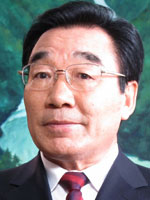Officials risk lives to aid Tibet
 0 Comment(s)
0 Comment(s) Print
Print E-mail China Daily, January 26, 2011
E-mail China Daily, January 26, 2011
 |
|
Zhang Qingli is Party chief of the Tibet autonomous region. |
Officials of Southwest China's Tibet autonomous region are all "risking their lives" to work for extended periods of time in its harsh environment - a lack of oxygen due to high altitude - so all of them deserve great respect, said Tibet Party chief Zhang Qingli.
"Many officials developed plateau sickness after they came to work here from plain areas, but they've never complained. They're prepared to give up several years of their lives for Tibet's development," Zhang said in a recent interview.
The oxygen content of air in Tibet, which has an average altitude of 4,000 meters, is only 62 percent of that in coastal regions. It has caused many officials to die at younger ages, he added.
"More than 4,100 officials in Tibet have passed away since 2001 at an average age of 64, which falls short of China's average life expectancy of 72," Zhang said. "Working in Tibet is a challenge."
Zhang, who just turned 60 this January, was warned at the end of 2005 - when he was appointed Party chief of Tibet - that he would suffer from the tough natural conditions due to his age, but he said if local Tibetans could live there he could too.
"People normally have three meals a day but the majority of officials who come to work in Tibet need to have five. Besides breakfast, lunch and dinner, they take tablets to control blood pressure as well as sleeping pills because they have trouble sleeping, which is one of the side effects of living in a plateau area for a long time," he said.
Zhang was described as a "backpack leader" because he traveled more than 10,000 kilometers to remote villages in the first six months he was in Tibet.
Now he has visited all the 73 counties because he loves to hear Tibetans' words "from the neck down" - an expression used to describe words from the bottom of their hearts.
Zhang spends almost every Tibetan new year with local farmers and herders because he believes talking to them face to face and learning about their needs works much better than talking for hours at conferences. He also witnessed how people's lives were transformed during the past five years.
Zhang said the region faces the greatest difficulties among all provinces, municipalities and autonomous regions in China in achieving development goals because Tibet has not only the harshest natural conditions but also the most complicated social environment.
"Tibet's development is constantly disrupted by foreign anti-China forces and the Dalai clique," he said.
The Dalai clique initiated a series of violent crimes involving beatings, smashing, looting and arson in Lhasa on March 14, 2008, which left 19 dead and more than 400 people injured.
Prior to his role as the Party chief of Tibet, Zhang had six years of working experience in senior positions in the Xinjiang Uygur autonomous region. He said both regions share great similarities as both are China's frontier ethnic areas.
But there are still differences.
Xinjiang has many ethic groups including Uygur (48 percent), Han (36 percent), and Kazak (8 percent) among others, while in Tibet, Tibetans make up 95 percent of the population, Zhang explained.
He added that Xinjiang has more than 20,000 mosques but only 8,000 imams. Meanwhile, Tibet has fewer than 1,800 Tibetan-Buddhist temples but is home to more than 46,000 monks.
The East Turkistan Islamic Movement, the main separatist force in Xinjiang, has been listed as a terrorist group by the United Nations so authorities can fight them when they strike. But the strategy to deal with separatist forces in Tibet, such as the Tibetan Youth Congress, needs to be different because they're not categorized as terrorists yet, Zhang said.
Despite all the interruptions, however, Tibet's economy surpassed 50 billion yuan ($7.6 billion) in 2010, a 79-percent increase compared to 2005 - an annual growth of 12.4 percent over the past five years.
In a region where people even have difficulties breathing due to harsh conditions, development cannot be rushed, Zhang said, adding that what the Tibetan people have achieved in the past five years is already remarkable.





